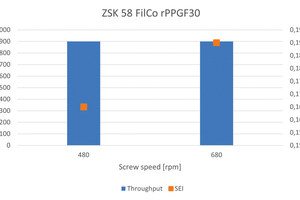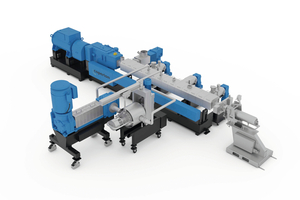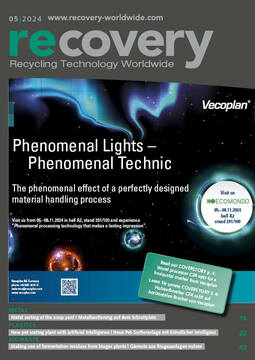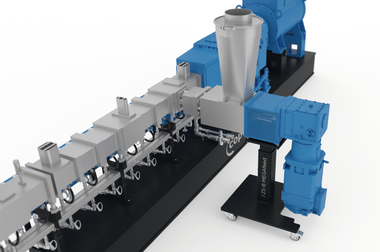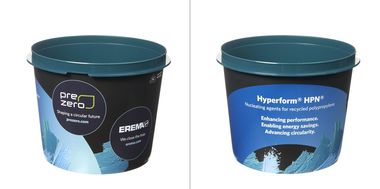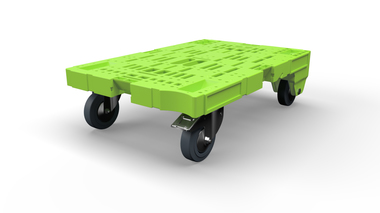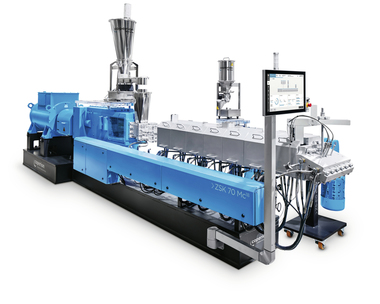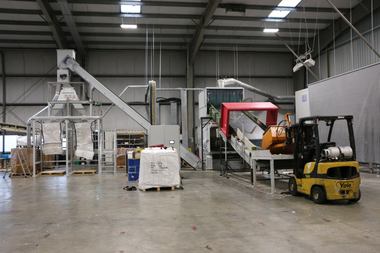ZSK FilCo Filtration Compounder enables higher product quality and reduced energy consumption
Coperion’s new ZSK FilCo simplifies post-consumer waste recycling by combining filtration and compounding in one single production step, leading to higher energy efficiency and significantly reduced thermal load on the recyclate. The system can then achieve markedly higher product quality while dropping energy consumption and emissions from the extrusion process.
In this day and age in which sustainability is not just an option but a necessity, negative attitudes toward plastics stem in part from insufficient information regarding the state of developments in recycling technology. In fact, complex material streams can already be processed today, such as used packaging plastics that are being recycled into post-consumer recyclates (PCR), to name one example. In this case, key technologies such as Coperion’s ZSK FilCo filtration compounder contribute significantly to improvements in process efficiency and effectiveness.
Impurities reduce quality
Impurities are a major challenge in all recycling processes. They hamper the process and compromise the quality of recycled materials. Plastic waste often contains dirt, oils, and mixed polymers that drastically reduce the marketability and usability of recyclates if they cannot be removed from the melt.
An innovative solution such as the Coperion ZSK FilCo filtration compounder, is the key to overcoming this challenge because it removes such impurities with high efficiency from reusable plastics. To achieve this result, the material is first melted and then fed through a series of fine filters that capture the impurities and then the decontaminated melt is processed. The ZSK FilCo is designed to handle various types of impurities and it produces recycled material that demonstrates high purity and can be used in heavy-duty applications. The life cycle of the plastic is thus extended and demand for new material drops.
From an economic perspective, the ZSK FilCo filtration compounder can make recycling more attractive and profitable. High-quality recyclates fetch better prices on the market, which then induces more companies to invest in recycling technologies.
Filtration and compounding in one single production step
While melting and filtration are the prerequisites for this use of plastic that both renews and adds value to plastic waste, the ZSK FilCo also takes over the application-specific enhancement of the material – compounding with fillers, reinforcing materials, and additives. Since all three processes take place in a single process step, the raw material only needs to be melted once. This reduces the mechanical and thermal stress on the plastic versus conventional two-step processes in which the waste plastic is melted and cooled separately for the filtration and compounding steps. The result is markedly higher regranulate quality.
The reduced stress on the waste plastic when recycling with the ZSK FilCo is visible in the SEI specific energy input. The graphic displays the energy input for processing PP-based waste plastic. Here, the polymer is first filtered using the ZSK FilCo and then reinforced with glass fibers. One added value of the twin screw extruder is that the throughput and screw speed can be set independently of one another. To achieve a constant throughput of 900 kg/h, for example, the extruder’s screw speed can vary. At low screw speed, the process is especially gentle on product and the SEI is low. At a higher screw speed, the mixing behavior and SEI are higher. In both cases, the energy input and thus the stress on the plastic remain fundamentally under 0.200 kWh/kg, which is in a similar range to that of new material processing.
High-quality recycled plastics can be used in a broad range of applications including packaging, automotive parts and consumer goods that were previously limited to virgin plastics. Moreover, the ZSK FilCo improves the efficiency of the recycling process as well. The ZSK FilCo allows continuous processing which reduces residence times in the recycling equipment and increases the throughput. All of this not only makes the recycling process more economical but also ensures that more materials are processed within a specific timeframe.
One plus in sustainability
The ZSK FilCo’s environmental benefit is substantial. Because this system ensures that the recycled materials are of high quality and free of impurities, it contributes to lower demand for new material that, as a rule, comes from resource-intensive processes. Moreover, the higher quality of the recycled materials means that the products made from it can achieve a longer lifespan, leading to reduced amounts of waste disposal.

